

Storyboarding For People Who Can't Draw (Like Me!) : FRIDAY 101. Design as Participation. You’re Not Stuck In Traffic You Are Traffic This started with a drivetime conversation about contemporary design with Joi Ito.
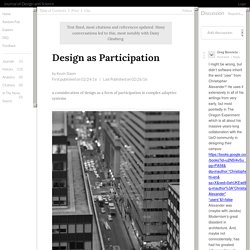
We were stuck in traffic, and in our conversation, a question emerged about designers: The answer is another question, a hypothesis. The hypothesis is that most designers that are deliberately working with complex adaptive systems cannot help but be humbled by them. Maybe those who really design systems-interacting-with-systems approach their relationships to said systems with the daunting complexity of influence, rather than the hubris of definition or control.
The designers of complex adaptive systems are not strictly designing systems themselves. 'Mies understood that the geometry of his building would be perfect until people got involved' We’re treating soil like dirt. It’s a fatal mistake, because all human life depends on it. Talking Rubbish - Sustainable Living Festival. The Rogue Ginger. The Rogue Ginger. Joost 'Closes the Loop' at Silo. Joost Bakker and Closed Loop collaborate to help achieve Zero Waste at Silo cafe in Hardware Street Melbourne.
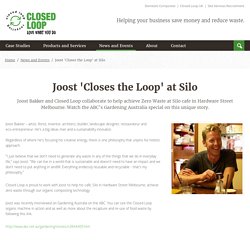
Watch the ABC’s Gardening Australia special on this unique story. Gardening Australia - Fact Sheet: Closing the Loop. Presenter: John Patrick, 14/09/2013 SERIES 24 Episode 26 John meets a sustainability innovator.
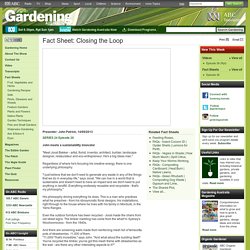
Waste-free cafe to close over compost dispute. Joost Bakker, owner of Brothl, a zero-waste restaurant, is closing next week after a long running dispute with Melbourne City Council over their composter being in the laneway outside.
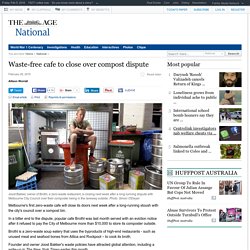
Photo: Simon O'Dwyer Melbourne's first zero-waste cafe will close its doors next week after a long-running stoush with the city's council over a compost bin. In a bitter end to the dispute, popular cafe Brothl was last month served with an eviction notice after it refused to pay the City of Melbourne more than $10,000 to store its composter outside. Untitled. Interview: Joost Bakker on sustainability. Joost Bakker is an environmental visionary who turns radical ideas into reality.
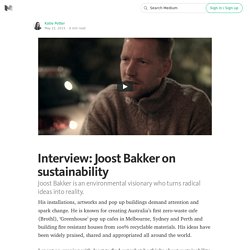
His installations, artworks and pop up buildings demand attention and spark change. He is known for creating Australia’s first zero-waste cafe (Brothl), ‘Greenhouse’ pop up cafes in Melbourne, Sydney and Perth and building fire resistant houses from 100% recyclable materials. His ideas have been widely praised, shared and appropriated all around the world. I spent an evening with Joost to find out what he thinks about sustainability, human behaviour and the role of technology.
K: Why do you think behaviours like reuse, recycle and upcycle are not fully accepted by society? If you go back only 70 or 80 years, you didn’t throw anything away. William McDonough: Cradle to cradle design. Melbourne Zoo. John Hunter: Teaching with the World Peace Game. About the Game - World Peace Game Foundation. The game is actually far more complex than glimpsed in the TED Talk or in the documentary film.

Here’s what the game requires to be facilitated, played, and maintained: Students who play must: In Japan's Zero-Waste Town, Recycling Requires Zen-Like Patience. If you thought sorting out your recycling every week was a bit tedious, spare a thought for the residents of Kamikatsu, a village in Japan.
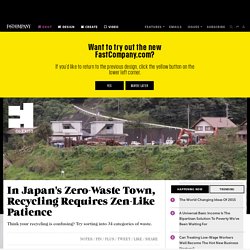
Yes, you recycle. But until you start reducing, you're still killing the planet. I talk a lot about reduction.
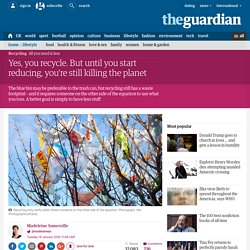
Reducing the number of toys you have, the quantity of cleaning supplies you buy, even the amount of meat you eat. My constant focus on reduction over recycling, upcycling or disposing of waste responsibly is a deliberate one. Put simply, recycling isn’t enough. Open University Guide to Diagrams. Why Games & Learning. The meaning of knowing today has shifted from being able to recall and repeat information to being able to find it, evaluate it and use it compellingly at the right time and in the right context.
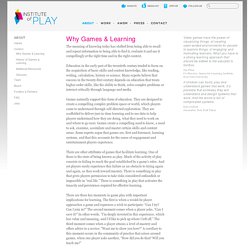
Education in the early part of the twentieth century tended to focus on the acquisition of basic skills and content knowledge, like reading, writing, calculation, history or science. Many experts believe that success in the twenty-first century depends on education that treats higher order skills, like the ability to think, solve complex problems or interact critically through language and media. Games naturally support this form of education. Toward Sustainable Design Thinking - thedesigngym.comthedesigngym.com. Best Festival Ever: How To Manage A Disaster » Boho Interactive. Best Festival Ever: How To Manage A Disaster is an interactive theatre performance based on Systems Science that takes place around a table.
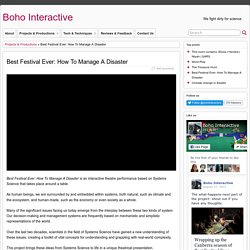
As human beings, we are surrounded by and embedded within systems, both natural, such as climate and the ecosystem, and human-made, such as the economy or even society as a whole. Many of the significant issues facing us today emerge from the interplay between these two kinds of system. Our decision-making and management systems are frequently based on mechanistic and simplistic representations of the world. Over the last two decades, scientists in the field of Systems Science have gained a new understanding of these issues, creating a toolkit of vital concepts for understanding and grappling with real-world complexity. This project brings these ideas from Systems Science to life in a unique theatrical presentation.
Through a variety of interactive games, the audience works together to program and deliver their own unique music festival. Getting it wrong on recycling. Complexity Simplified. Natural Farming and the Life and Work of Masanobu Fukuoka. Podcast: Play in new window | Download (Duration: 58:36 — 53.7MB) | Embed In this episode I have the great pleasure if connecting with Larry Korn from Oregon, USA. In addition to being a student of the late Masanobu Fukuoka (1913-2008) he’s and educator, consultant, editor and author in the fields of permaculture, natural farming, sustainable landscaping and local food production. Larry recently published a book titled One-Straw Revolutionary where he goes into the life and work of Masanobu Fukuoka, who initiated the natural farming movement. Larry spent several years together with Masanobu Fukuoka at his farm in Japan back in the 70’s, and he helped translate Fukuoka’s seminal book The One-Straw Revolution (1975).
In our conversation we explore Fukuoka’s work with a special emphasis on the underlying ideas, values or mental models that drive the natural farming method. The Stuff Problem. 'Yes to renewables! ' Microgrids Are Making Good Sense to Many Communities. (3Bl Media/Justmeans) - Our energy system is undergoing a massive amount of change. Whether it’s converting coal plants to natural gas, incorporating intermittent renewable sources like solar and wind farms, or dealing with demand management or distributed generation from residential rooftop solar; our traditional grid and its operators are experiencing a great deal of stress. A new tool, which is really an old tool that was buried deep in the toolbox, is offering improved capability for managing these changes with a number of additional fringe benefits.
That tool is the microgrid. In truth, microgrids have been around since the time of Thomas Edison, but as power systems rapidly expanded, they soon got left behind. But given the needs of the current environmnet, they are making quite a comeback. Recycling Plastic Is Surprisingly Complex. Here’s What Happens After the Bin. What is a circular economy? - Sustainability News - Sustainable Business Network. What is a circular economy? Essentially a circular economy is one where companies manage all resources as valuable assets. Executive Summary of Confessions of a Radical Industrialist by Ray Anderson – CATALYST. Publication Archive – CATALYST. Leading Creative Enterprise. ARCHIVESBLOGBooksDesign PolicyISSUE 14 | DESIGNING POLICY FOR PEOPLETOOLS. Future Deck. Strategic Communication Designer, Researcher and Systems Thinker - Systems Thinking. Mapping Climate Communication – slideshow for #COCE2015 and #UE2015. Linda Booth Sweeney > Learning About Systems > Tools & Techniques for Learning About Systems > Experiential Exercises.
“As corporate trainers and authors of books for trainers, we keep a lookout for quality and innovation in our field. The Systems Thinking Playbook is a handy three-ring binder filled with interactive lessons that breathe life into systems theory. These clear lesson plans make sometimes intimidating concepts accessible and can inspire course designers to strike off in their own creative directions. If any part of your job includes helping people function in groups or organizations, you should keep The Systems Thinking Playbook within easy reach.” Terry Irwin, Gideon Kossoff and Cameron Tonkinwise. HTML 5 accessible player with share button. Our mission : mission : shiftN.com. Visualizing controversies in Wikipedia.
Research. DensityDesign develops research projects in the domain of visual representation, stemming from a design perspective. EXPO 2015 Themes Visualization. In 2015 Milan will host the Universal Exposition for the second time in its history. 10 Useful Ideas on Systems Thinking - Futurist.com: Futurist Speaker Glen Hiemstra. By Richard Wilkinson, 2001. Sustainability: The Five Core Principles. Design is the Problem: An exclusive excerpt from Nathan Shedroff's new book on sustainable design practice. Oxford%20University%20Press%20-%20The%20Nature%20of%20Design%20-%20Ecology,%20Culture%20and%20Human%20Intention%20(2002).pdf. The Origins of Ecological Design (2006) Chp%3A10.5822%2F978-1-61091-017-0_20.pdf?originUrl= Berry_Solving_for_Pattern.pdf. The Intelligence of Ecological Design. The Designer's Challenge: Four Problems You Must Solve. Charlie Cannon presents Social Design Pathways.